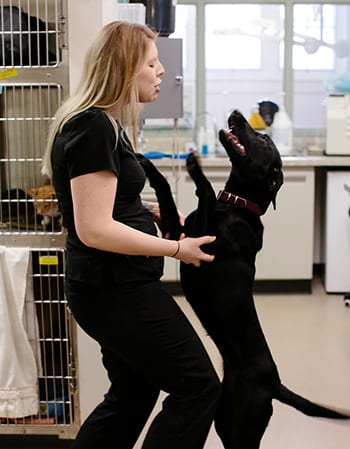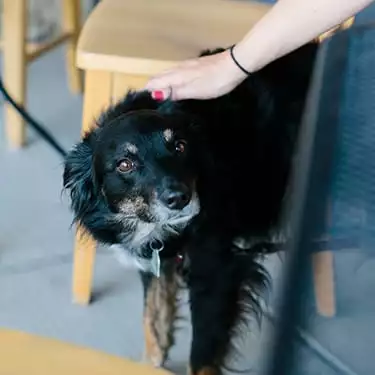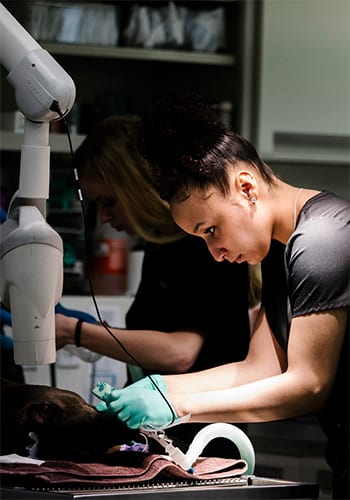Dog Teeth Cleaning in St. Paul, MN
Healthy pets stay even healthier with routine teeth cleaning that helps prevent gingivitis and dental disease. Without regular oral hygiene, your pet’s teeth and gums—and even their systemic health—can be affected. At St. Paul Pet Hospital, we not only provide professional cat and dog teeth cleaning services at our two locations, but we also educate pet parents about the benefits of dental care and why they should make it a part of their pets' daily routines at home.
A lack of oral hygiene can result in painful and even life-threatening conditions such as:
- Minor to severe oral pain
- Difficulty eating and chewing
- Swollen gums and inflammation of the jaw
- Tooth loss
- Infection in the gums and other tissues in the mouth
- Higher risk of developing heart valve, kidney, and liver inflammation

Be proactive about your pet's dental health. Schedule a dental visit today.
or call us at
- Cathedral Hill
or
- Highland Park.

Save Your Pet’s Teeth and Your Wallet with our Affordable Wellness Plans
When you enroll your pet in our Adult Cathedral Wellness plan, their annual dental cleaning, as well as comprehensive bloodwork before their procedure, is entirely covered in your monthly payments. That means no extra cost for a pearly white smile, fresh breath, and prevention of dental disease.
What’s Included in Professional Teeth Cleaning?
At St. Paul Pet Hospital, your pet’s safety and comfort are our top-most priorities. Therefore, every anesthetic procedure starts with pre-anesthetic bloodwork and an exam to ensure your pet has no underlying conditions that could affect their response to anesthesia. Then, we’re ready to begin the procedure which includes:
- Digital dental X-rays to identify signs of dental disease such as tooth damage, bone loss, periodontal pockets, and more
- Using ultrasonic and hand scaling instruments to remove hardened tartar on teeth both above and below the gum line
- Polishing of each tooth to smooth the enamel and make it harder for plaque to stick
- Extractions of teeth that are damaged*
*We’ll always check with you first before we proceed with extractions. If we do go ahead with the procedure, your pet receives ample pain medication to minimize their discomfort upon waking.
Signs Your Pet Needs Professional Teeth Cleaning
While brushing your pet’s teeth does have a positive impact on their dental health, these signs indicate that your pet will need professional dental care in order to reverse the effects of disease. Schedule a dental cleaning if you notice any of the following:
- Bad breath
- Gums are inflamed, appear red, and/or bleed easily
- Teeth are covered in brown plaque
- Pet is salivating excessively
- Chewing only occurs on one side or your pet tilts their head when they eat
- Some teeth appear to be loose
- Pet does not allow handling of the mouth

What You Can Do At Home
Professional cat and dog teeth cleanings can prevent and even reverse dental disease, but at-home dental care is just as important. Daily at-home dental care can lengthen the time between your pet’s professional cleanings. Many of the products listed below are available at our in-hospital pharmacy.
Here are some of the ways you can protect your pet’s teeth at home:
- Brush their teeth. This is the single most effective way to reduce plaque and tartar buildup, but we recognize it can also be the most challenging if your pet is not cooperative. Luckily, there are other options.
- Give them dental toys. Some toys are designed to help with plaque removal when your pet chews on them, meaning they can do something they love while also improving their own dental health!
- Replace traditional treats with dental chews and treats.
- Consider using other preventatives like oral wipes, water additives, and gels.
- Switch your pet to a tartar-control diet! These often require a veterinarian’s prescription, so ask us at your next visit about our recommendations!
We're always eager to talk about dental care and the health implications it has for your pet. To request advice for at-home care or to schedule an appointment, give us a call!

